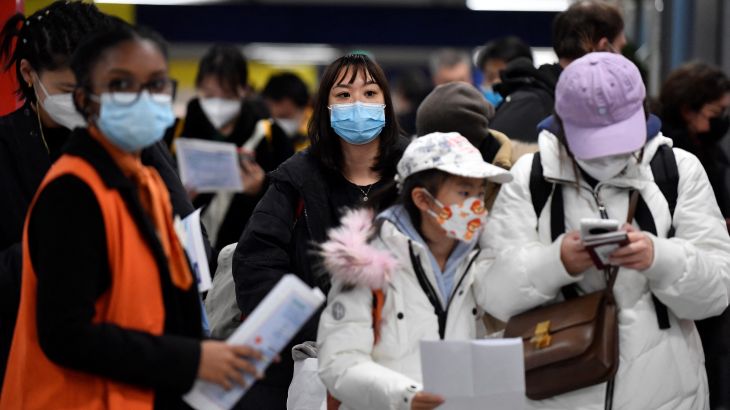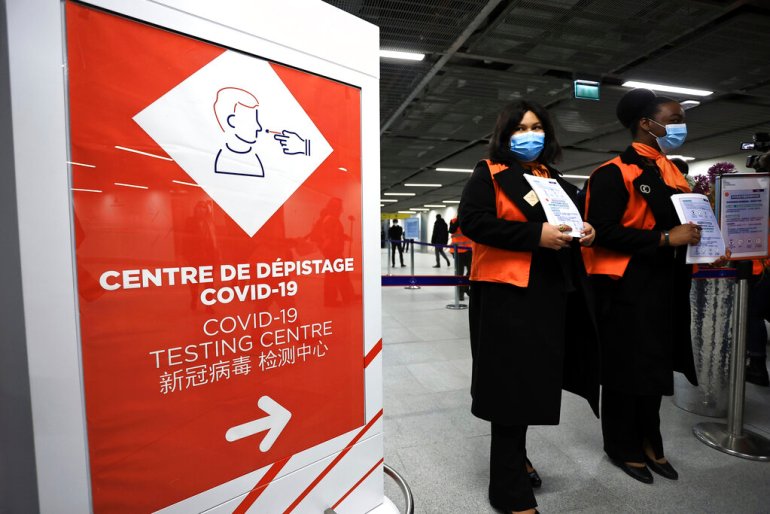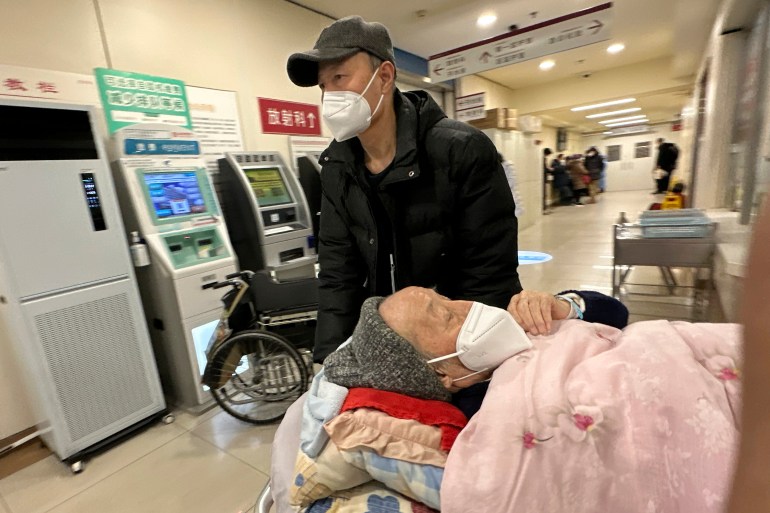China blasts ‘unacceptable’ COVID curbs on travellers
The US, Canada, Japan and France are among more than a dozen countries that have put curbs on travellers from China.

China has called the mounting international restrictions on travellers from its territory “unacceptable” after more than a dozen countries placed new coronavirus curbs on visitors from the world’s most populous nation.
The United States, Canada, and Japan are among countries insisting all travellers from China provide negative COVID-19 tests before arrival, as concerns grow over a surge in cases.
Keep reading
list of 3 itemsAustralia shunned health input on China COVID tests, letter shows
Which countries have placed COVID curbs on travellers from China?
An “overwhelming majority” of the EU’s 27 member countries, including France, Spain and Italy, also want passengers coming from China to be systematically tested for Covid before departure, the European Commission said on Tuesday.
The trio have already imposed testing requirements on arrivals from China pending a bloc-wide approach.
But a crisis meeting to be held Wednesday on the issue will decide what coordinated measures will be applied across the bloc.
The European Union fears a sudden influx of passengers from China could bring Covid variants that may be able to evade current vaccines.
There are also concerns that China’s data on infections is incomplete, partial and insufficient.
EU health commissioner Stella Kyriakides said the officials also agreed to recommend stepped-up monitoring of wastewater from flights and at airports to detect traces of Covid, and for member states to boost surveillance.
China’s steep rise in infections comes after Beijing abruptly lifted its zero-COVID policies in December, leading to hospitals and crematoriums quickly being overwhelmed.
Nevertheless, Beijing has pushed ahead with a long-awaited reopening, announcing an end to mandatory quarantine on arrival last week, in a move that prompted Chinese people to plan trips abroad.
“Some countries have taken entry restrictions targeting only Chinese travellers,” foreign ministry spokesperson Mao Ning told a regular briefing on Tuesday.
“This lacks scientific basis and some practices are unacceptable,” she added, warning China could “take countermeasures based on the principle of reciprocity”.

However, when asked about China’s reaction, France’s Prime Minister Elisabeth Borne defended the new rules.
“I think we’re performing our duty in asking for tests,” Borne told franceinfo radio. “We will continue to do it.”
The rules imposed affect all travellers coming from China, not just Chinese nationals, while Beijing continues to restrict inbound visitors and not issue visas for tourists or international students.
Countries, including the US, have also cited Beijing’s lack of transparency about infection data and the risk of new variants as a reason to restrict travellers.
China has only recorded 22 COVID deaths since December and has dramatically narrowed the criteria for classifying such deaths, meaning that Beijing’s own statistics about the unprecedented wave are now widely seen as not reflecting reality.
Virus overwhelms Shanghai
As health workers nationwide battle a surge in cases, a senior doctor at one of Shanghai’s top hospitals said 70 percent of the megacity’s population may now have been infected with COVID-19, state media reported on Tuesday.
Chen Erzhen, vice president at Ruijin Hospital and a member of Shanghai’s COVID expert advisory panel, estimated that the majority of the city’s 25 million people may have been infected.
“Now the spread of the epidemic in Shanghai is very wide, and it may have reached 70 percent of the population, which is 20 to 30 times more than [in April and May],” he told Jiangdong Studio, owned by the Communist Party mouthpiece People’s Daily.

In other major cities, including Beijing, Tianjin, Chongqing and Guangzhou, Chinese health officials have suggested that the wave has already peaked.
Concerns have also been raised about the near-term growth prospects in the world’s second-largest economy, causing volatility in global financial markets.
Data on Tuesday showed China’s factory activity shrank at a sharper pace in December.
Last month, shipments from Foxconn’s Zhengzhou iPhone plant, disrupted by worker departures and unrest amid a COVID outbreak, were 90 percent of the firm’s initial plans.
A “bushfire” of infections in China in coming months is likely to hurt its economy this year and drag global growth lower, said the head of the International Monetary Fund, Kristalina Georgieva.
“China is entering the most dangerous weeks of the pandemic,” warned Capital Economics analysts.
Mobility data suggested that economic activity was depressed nationwide and would likely remain so until infections subsided, they added.